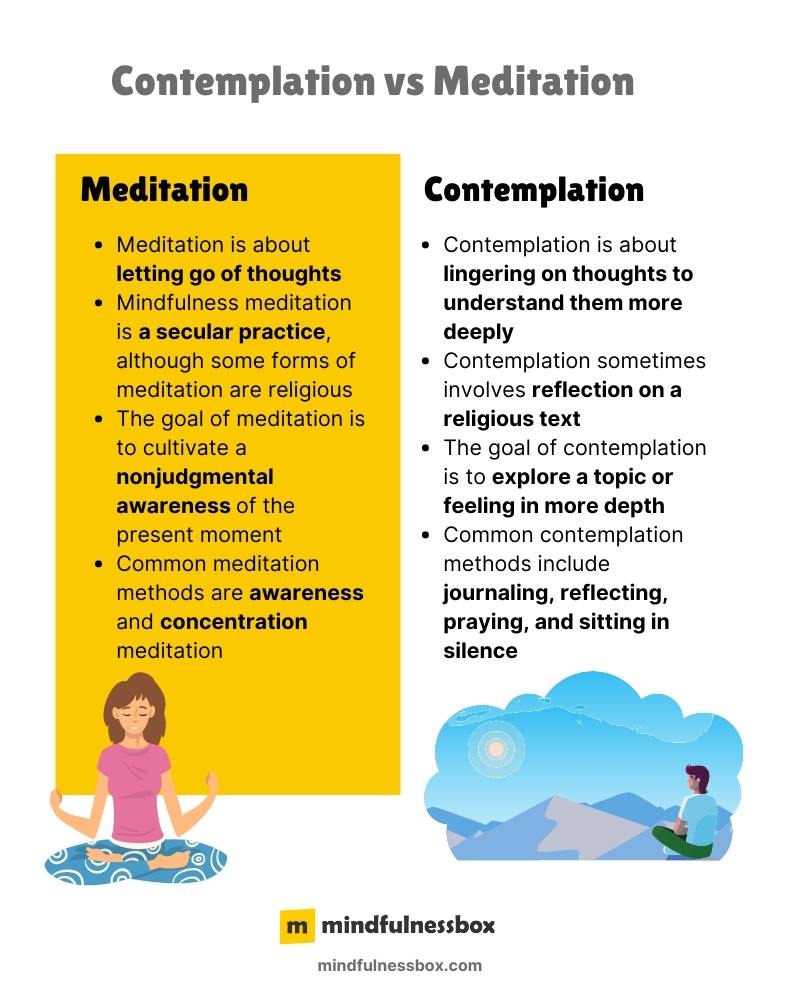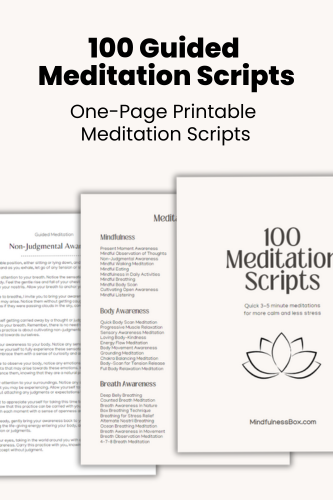The main difference between contemplation and meditation is that meditation is a practice that focuses on clearing the mind, while contemplation is a more analytical and reflective practice that involves thinking deeply about a particular topic or concept.
Sometimes, all you need is to understand your own thoughts. When that happens, you sit down and journal, working to get out everything that’s on your mind. Then, you reflect on it.
These 100 meditation scripts were created to help beginner and intermediate meditators practice key mindfulness concepts like self-love, forgiveness, gratitude, and inner peace.
Designed to fit into busy schedules, each meditation script lasts 3-5 minutes. Perfect for starting or closing a group meditation; for yoga, coaching, or therapy sessions; or for your personal meditation practice.
That’s a form of contemplation.
Sometimes, all you need is for your racing thoughts to quiet down and your mind to calm. So you sit down and focus on your breath silently.
That’s meditation.
Easy enough, right? In fact, there’s a bit more to it.
Let’s explore the difference between meditation and contemplation.
What is the difference between meditation and contemplation?

While in meditation your task is to let go of thoughts, in contemplation your task is to linger on them and reflect in order to understand them more deeply.
The practice of meditation has been around for centuries. There are many different techniques and types of meditation, generally focused around focusing and calming the mind while reducing psychological suffering.
Contemplation, on the other hand, is the practice of absorbing information or ideas and then sitting with them for some time, letting them wash over your mind.
The purpose of contemplation is to allow the mind to explore a topic or idea in more depth. This can be done in a number of ways, such as by thinking about the implications of the idea, considering how it might be applied in your life, or reflecting on your own reactions to it.
Here’s a point-by-point comparison between meditation and contemplation.
| Meditation | Contemplation |
| Meditation is about letting go of thoughts | Contemplation is about lingering on thoughts to understand them more deeply |
| Mindfulness meditation is a secular practice, although some forms of meditation are religious | Contemplation sometimes involves reflection on a religious text |
| The goal of meditation is to cultivate a nonjudgmental awareness of the present moment | The goal of contemplation is to explore a topic or feeling in more depth |
| Common meditation methods are awareness and concentration meditation | Common contemplation methods include journaling, reflecting, praying, and sitting in silence |
What is contemplation?
Contemplation has a lot of crossover with meditation. There are a number of contemplative practices that look similar.
What is contemplative meditation, for example? Contemplation meditation is a form of mindfulness meditation that involves thinking deeply about a particular topic or concept.
The purpose of contemplative meditation is to allow the mind to explore a topic or idea in more depth, and to understand it better.
Similarly, with contemplative prayer, you focus your thoughts on a particular topic or concept, and allow yourself to explore it deeply. For example, it’s common in Christian meditation to read a Bible verse, and then spend time reflecting on that verse.
What is contemplation meditation in a religious context?

The word contemplation on its own simply refers to a state of deep thinking and reflection.
In the context of meditation, contemplation typically refers to a religious practice. In contrast, meditation can be religious, but it is frequently a secular practice as well.
Contemplation can involve exploring the implications of an idea, considering how it might be applied in your life, or reflecting on your own reactions to it.
In a religious context, contemplation might involve reading a Bible passage and then sitting silently.
You can even visualize yourself “inside” the event or idea you’re contemplating.
This is the case with a Christian practice called Lectio Divina. Lectio Divina is a type of Christian contemplation that involves reading a Bible passage four times, and then spending time to meditate and contemplate.
It’s common to immerse yourself in the passage in order to understand it on a personal level, noticing your senses and imagining how things would smell, feel, taste, look, and sound.
What are examples of contemplative practices?
The practice of contemplation can be done in a number of ways, depending on what works best for you.
Some people like to sit in silence and focus on their breath while reflecting on a concept, while others prefer to write about their thoughts and feelings.
You can also try meditating on a particular topic or idea, or brainstorming ways to apply it to your life
Some of the most common forms of contemplation include:
- Journaling
- Reflecting on your day
- Thinking about a religious passage
- Praying
- Sitting in silence
Contemplation is reflection, meditation is letting go
Contemplation and meditation are easy to choose from on a practical level, because they have different end goals.
If you’re working towards improving your powers of attention and focus, reducing psychological suffering, and letting go of persistent negative patterns of thinking, meditation is the tool for you. Sitting silently while focusing on your breath will likely help. If you need help getting started, a meditation subscription box may support your practice at the beginning.
If, on the other hand, your goal is to better understand a concept, religious text, or even your own thoughts, contemplation is the tool for you. Start by journaling, or by reading a passage multiple times. You can even imagine yourself inside a passage you read.
Contemplation is about understanding. Meditation is about letting go.
Frequently asked questions
What’s the difference between contemplation and mindfulness?
The main difference between contemplation and mindfulness is that mindfulness is about being in the present moment, while contemplation involves reflecting on past or future events, or reflecting on ideas or inspiration. Reflective contemplation and contemplative meditation are two common types of contemplation meditation.

My mindfulness practice kicked off in 2016 with a ten-day silent retreat. Since then, I’ve read dozens of books about mindfulness and completed hundreds of hours of meditation. Thinking about what makes humans happy, calm, and peaceful is endlessly fascinating to me.


